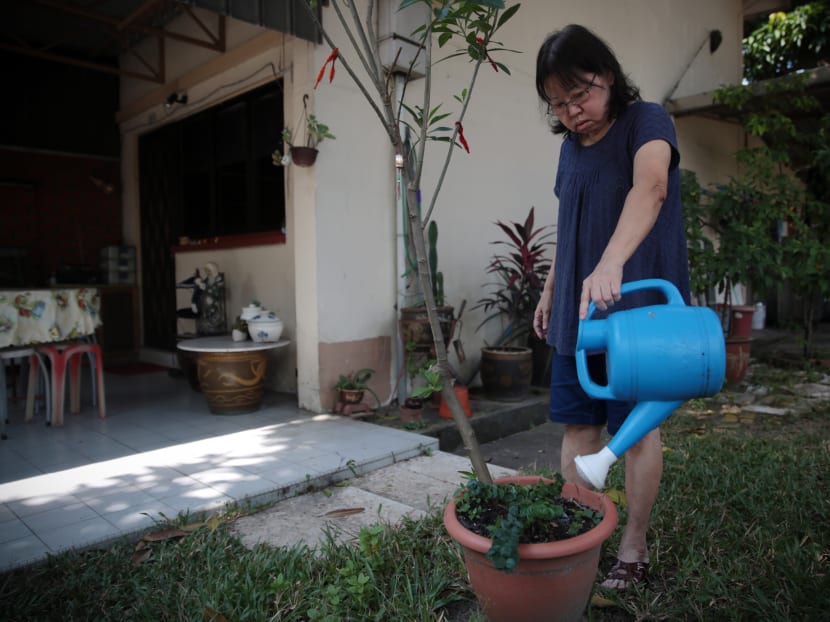Property landmark: Geylang plot returns to state when lease expires
SINGAPORE – In three-and-a-half years, the 191 private terrace houses along Geylang Lorong 3 will be demolished to make way for public housing, as the land they occupy becomes the first residential plot to be returned to the state upon expiry of the 60-year lease.

Mdm Tan Whay Seok at her residence, one of the terrace houses at Lorong 3 Geylang, on June 20, 2017. Photo: Jason Quah/TODAY
SINGAPORE – In three-and-a-half years, the 191 private terrace houses along Geylang Lorong 3 will be demolished to make way for public housing, as the land they occupy becomes the first residential plot to be returned to the state upon expiry of the 60-year lease.
The occupants have until the end of 2020 to remove all their belongings, clear the premises, terminate all utilities and services, and pay all outstanding bills, the Singapore Land Authority (SLA) said Tuesday (June 20).
The owners of the properties will not be entitled to any compensation, unlike those affected by compulsory land acquisition, because the 2ha plot of land will be returned to the state upon lease expiry "as a general policy", said SLA chief executive Tan Boon Khai.
Property analysts said the Government has made it clear that ownership of land will revert to the state upon lease expiry, in the absence of any renewals. "The Government has set a precedent that you only have so many years' lease. So buyers should be aware of properties with short leases. The SLA will not want to set a precedent by giving home owners' compensation," said Mr Colin Tan, director of research and consultancy at Suntec Real Estate Consultants.
The SLA said it did not receive any formal application to extend the lease at Geylang Lorong 3, although it has received five enquiries on lease renewal and one enquiry on the lease expiry process from owners since 2009.
Besides Geylang Lorong 3, there are no other 60 year private residential leases issued by the state, SLA said. "More than 99 per cent of private residential leasehold units have more than 50 years of tenure left. The next major estate affected by lease expiry will be Fuyong Estate in 2046," it said.
About 900 metres from Kallang MRT station and 500 metres from the new Geylang Bahru MRT station which will open this October, the terrace houses at Geylang Lorong 3 are on 60-year leases which began in 1961 and will expire on 31 December 2020.
The redevelopment is part of the larger plan to rejuvenate Kallang and provide new public housing options for Singaporeans who wish to live near the city centre, the SLA said. As outlined in the Master Plan 2014, Kallang will offer quality housing, green spaces, water bodies, and new public facilities like the Sports Hub, it noted.
SLA could not give information on the number of public housing flats that will be built on the site, or when the redevelopment process will be completed, as the plans have yet to be finalised.
Today, most of the owners of the 191 terrace houses have already moved out and are letting out their units to foreign workers and other occupants who use them for religious activities, the SLA said. It said each owner has been assigned a dedicated officer to guide them through the lease expiry process. In the following two months, the SLA officers will also hold personal sessions with each household to help them in the transition to ensure that they "will not be left without options".
Options for the remaining owner-occupants include buying a Housing and Development Board (HDB) flat or private property, renting on the open market or living with their family members, the SLA said. For elderly owner-occupants, there are also existing schemes such as the HDB's short-lease two-room Flexi flats.
Employers of foreign work pass holders may consider relocating their workers to other approved housing, such as purpose-built dormitories. Occupants who are currently conducting religious activities can consider co-locating with religious organisations operating in other areas, or rent a space from commercial or industrial premises where a portion of the gross floor area can be used for religious purposes on a limited, non-exclusive basis, the SLA added. ADDITIONAL REPORTING BY TAN WEIZHEN








